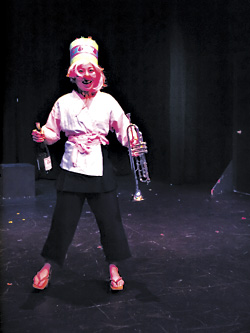The Oddfellows Hall on Capitol Hill needs some improvements. The elevator is small and cramped, and sometimes it doesn’t feel like it’s going to make it to the third floor. Everything could use some paint, and to find a bathroom, you need to track down someone, then find someone else who has a key, then find your way back to wherever the hell the bathroom is. The small theater venues in the building are makeshift, though the Velocity Dance Center and the Century Ballroom are only shabby in a splendid way.
A few hundred thousand dollars could transform the place into an amazing arts center. Unfortunately, none of the small nonprofit art groups that occupy the building have that kind of money. The building’s new owners, GTS Development, do, but their vision for the building is unlikely to include any of the current tenants. “It was interesting talking to them,” says Robin Smith, artistic director of Freehold, a theater school/performance center that’s been an Oddfellows tenant for 16 years. “They really, really don’t get it. They’d say, ‘I’m not really into the theater,’ and OK, sure, a lot of people are like that. But they don’t really get why the arts are important at all.”
(The head of GTS, Ted Schroth, didn’t return calls for comment. In a press release last week he said: “Paying a market rate for the building that will not be torn down creates the economic reality of having to raise rents in order to make retaining the building feasible from an investment standpoint.” He also said he would explore ways to “retain an arts culture” at the building.)
Smith says news of the sale was a shock, as the current owners had told her as recently as this summer that they planned to hold on to the building for at least a couple more years. They’d been supportive of Freehold, happy to have a tenant who kept the building bustling with artists while maintaining two theaters (the 99-seat main theater and a recently completed 49-seat black box).
Freehold’s faculty includes some of Seattle’s best theater artists: actors like Matt Smith, Amy Thone, Timothy Piggee, and Shelley Reynolds; and writers like Elizabeth Heffron, Paul Mullin, and Vince Delaney. Smith allows them to structure their syllabus around their own passions, instead of a pre-existing series of lesson plans. “Giving them that freedom to determine what they’ll teach is a large part of what makes Freehold different from other places, and keeps such great teachers here.” Freehold also accepts students of any age or experience, and their classes range from Intro to Acting to a three-year conservatory program.
At the time Freehold moved into the Hall, it was still owned by the Oddfellows Order. The rent was cheap and the rooms spacious, so the seven founders promptly converted a large hall on the second floor into a theater and several rooms on the first floor into rehearsal rooms and a small office. The rehearsal rooms are dingy and the radiators knock like trapped pit miners, but Freehold’s cheap rent is passed on to artists; I’ve routinely used their spaces, along with half the theater community of Seattle. (I’ve also participated in some of their new-works festivals, and they have commissioned some of my work.)
“The biggest problem for Freehold is that they’re ground floor. That’s a prime site for retail or a restaurant,” says Jim Kelly, executive director of King County’s 4 Culture. Indeed, as reported on the Daily Weekly blog, GTS has applied to the city to change the usage of some spaces on the building’s first floor.
Like several administrators and artists I’ve spoken with, Kelly wishes that there’d been the cash and the foresight to purchase the building for the arts years ago. But efforts from state and city governments are too slow to match the current frenzied pace of gentrification—a recent plan by the mayor’s office to provide financial incentives for new developers is still on the drafting table.
For Smith, the very fact that the new owners don’t see the value of Freehold is a sign that its work is vital. “As long as people, and that includes developers, don’t see the inherent value of arts and artists, it shows we haven’t succeeded in our mission to show them why we matter.” Assuming the new owners don’t see it the same way, Freehold will be homeless in a matter of months.








